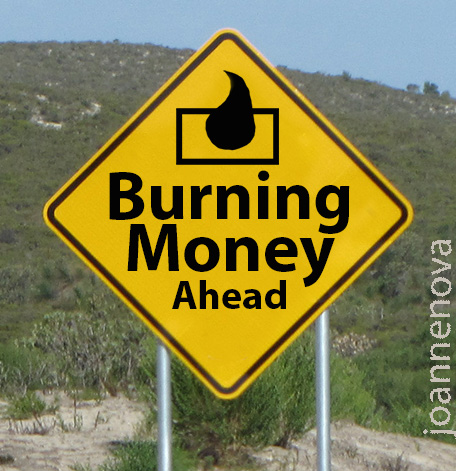By Jo Nova
 Word is spreading openly of the awful third quarter results in wind and solar power, and in EV’s. Morningstar noted some $14 billion dollars moved out of sustainability funds in the last quarter even before the dismal results were announced. This is only a small part of the $300 billion total, but it’s a big bad shift in momentum in a sector that is supposed to be going exponential and theoretically “the next big thing”.
Word is spreading openly of the awful third quarter results in wind and solar power, and in EV’s. Morningstar noted some $14 billion dollars moved out of sustainability funds in the last quarter even before the dismal results were announced. This is only a small part of the $300 billion total, but it’s a big bad shift in momentum in a sector that is supposed to be going exponential and theoretically “the next big thing”.
Two years ago funds were tagging anything they could with Sustainability. But the term has become a dirty word, and so has ESG. Funds that were enthusiastically adding these green terms to their titles are now dropping them and backing away slowly…
With major daily business newspapers now reporting the bad news it’s hard to see what will stop the slide — only massive subsidies would do that (temporarily), but the US has already done that with the bizarrely named Inflation Reduction Act.
But make no mistake, there is a $300 billion industry begging for help and a lot of politicians who don’t want to admit their renewables push was an economic disaster. The German government has bailed out Siemens, and the UK government is throwing money at wind power to try to get investors back. It’s like communism by stealth. The government demands industries do magical things, then when they fail, it saves them, making industry increasingly serve governments instead of customers. But the money, or the system can’t go on forever…
Wall Street’s ESG Craze Is Fading
By Shane Shifflett, Wall Street Journal
Wall Street rushed to embrace sustainable investing just a few years ago. Now it is quietly closing funds or scrubbing their names after disappointing returns that have investors cashing out billions.
The third quarter was the first time more sustainable funds liquidated or removed ESG criteria from their investment practices than were added, according to Morningstar. That is a reversal from not that long ago, when companies were rebranding faltering funds to cash in on the billions of dollars flowing into sustainable investment products.
At least five other funds also announced they would drop their ESG mandates this year, while another 32 sustainable funds will close, according to data compiled by Morningstar and The Wall Street Journal.
One venture capitalist says Net Zero policies are political pipedreams, and Venture Capitalists knew years ago that industries dependent on government handouts might collapse like Enron:
Net-zero policies colliding with economic reality
Henry Geraedts, Financial Post
As early as 2018, key industry executives warned that the renewables sector risked an Enron-style collapse because of its insatiable subsidy-dependence. That unwinding is now happening across the wind, solar and EV industries, and it’s driven by dynamics unlikely to be reversed.
As demand falters, skyrocketing costs are outstripping even massive subsidies.
Faced with crippling technical problems, growing warranty exposure and companies like Shell walking away from multi-billion-dollar projects, industry leaders Orsted, Vestas and Siemens Gamesa are in structural financial crisis, their shares down by 30 to 60 per cent. Siemens Energy’s recent request for a $16-billion bailout prompted BP’s head of renewable energy to say the industry was “broken.”
What we are witnessing are not bumps in the road to an inevitable clean energy transition but evidence of socio-economic realities unravelling the politics of net zero — including the fiction that we must urgently and radically re-engineer our societies to stop a supposed climate catastrophe that in fact isn’t.
Henry Geraedts worked in venture capital internationally. His PhD is in international political economy, with an interest in strategic aspects of energy and technology.
Three weeks ago the head of renewables for BP used the word “broken”:
BP Executive Describes The U.S. Offshore Wind Industry As “Fundamentally Broken”
Reuters, Nov 1
The offshore wind industry, one of the fastest growing energy sectors, has recently suffered a string of major setbacks due to equipment reliability issues, supply chain problems and sharp cost increases.
Anja-Isabel Dotzenrath, BP’s head of gas and low carbon, said that problems in the United States included permitting, the time lag between signing power purchase agreements and projects being built and a lack of inflationary adjustment mechanisms.
“Ultimately, offshore wind in the U.S. is fundamentally broken,” Dotzenrath told an FT Energy Transition conference in London.
The profit margins are so thin, and the approval process is so long and complex (because they use so much space), that inflation is eating their returns before they even start.
h/t Marcel, Willie Soon and NetZeroWatch.


